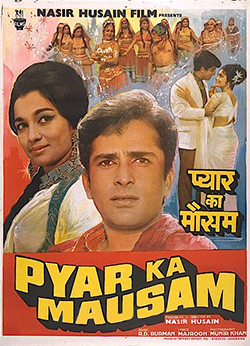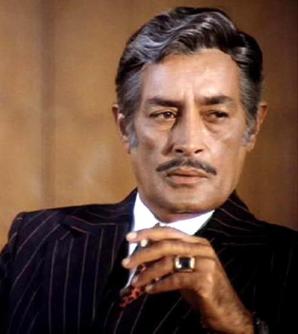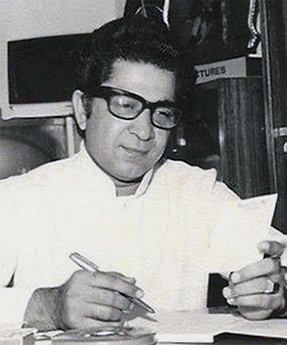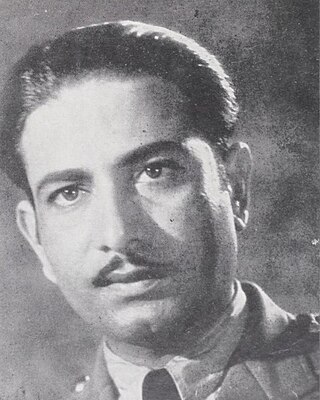Related Research Articles

Hemanta Mukhopadhyay, known professionally as Hemant Kumar and Hemanta Mukherjee, was a legendary Indian music director and playback singer who primarily sang in Bengali and Hindi, as well as other Indian languages like Marathi, Gujarati, Odia, Assamese, Tamil, Punjabi, Bhojpuri, Konkani, Sanskrit and Urdu. He was an artist of Bengali and Hindi film music, Rabindra Sangeet, and many other genres. He was the recipient of two National Awards for Best Male Playback Singer and was popularly known as the "voice of God".

Kishore Kumar was an Indian playback singer, musician and actor. He is widely regarded as one of the greatest, most influential and dynamic singers in the history of Indian music. Kumar was one of the most popular singers in the Indian subcontinent, notable for his yodelling and ability to sing songs in different voices. He used to sing in different genres but some of his rare compositions, considered classics, were lost in time.

Rahul Dev Burman, known professionally as R.D. Burman, was an Indian music director and actor, who is considered to be one of the greatest and most successful music directors of the Hindi film music industry. From the 1960s to the 1990s, Burman composed musical scores for 331 films, bringing a new level of music ensemble with his compositions. Burman did his major work with legendary singers Lata Mangeshkar, Asha Bhosle, and Kishore Kumar. He also worked extensively with lyricist Gulzar, with whom he has some of the most memorable numbers in his career. Nicknamed Pancham, he was the only son of the composer Sachin Dev Burman.

Prabodh Chandra Dey, known by his stage name Manna Dey, was a renowned Indian playback singer, music director, and musician. He had a classical music background, being part of the Bhendibazaar Gharana and receiving training under Ustad Aman Ali Khan. Manna Dey is widely recognized as one of the most versatile and celebrated vocalists in the Hindi film industry, and is often acknowledged for his significant contributions to integrating Indian classical music into Hindi commercial cinema. As a musician, Dey is particularly acclaimed for incorporating Indian classical music elements into a pop musical framework, a contribution that played a pivotal role during the golden era of Hindi cinema.

Madan Mohan Kohli, better known as Madan Mohan, was an Indian music director of the 1950s, 1960s and the 1970s. He is considered one of the most melodious and skilled music directors of the Hindi film industry. He is particularly remembered for the immortal ghazals he composed for Hindi films. Some of his best works are with singers Lata Mangeshkar, Mohammed Rafi and Talat Mahmood.

Salil Chowdhury was an Indian music director, songwriter, lyricist, writer and poet who predominantly composed for Bengali, Hindi and Malayalam films. He composed music for films in 13 languages. This includes over 75 Hindi films, 41 Bengali films, 27 Malayalam films, and a few Marathi, Tamil, Telugu, Kannada, Gujarati, Odia and Assamese films. His musical ability was widely recognised and acknowledged in the Indian film industry. He was an accomplished composer and arranger who was proficient in several musical instruments, including flute, the piano, and the esraj. He was also widely acclaimed and admired for his inspirational and original poetry in Bengali.

Shakti Samanta was an Indian film director and producer, who founded Shakti Films in 1957, which is most known for films such as Anand Ashram (1977), Anusandhan /Barsaat Ki Ek Raat (1981), Anyay Abhichar (1985), Howrah Bridge (1958), Insan Jaag Utha (1959), China Town (1962), Kashmir Ki Kali (1964), An Evening in Paris (1967), Aradhana (1969), Kati Patang (1971), and Amar Prem (1972), Amanush.

Anand Bakshi was an Indian poet and lyricist. He was nominated for the Filmfare Award for Best Lyricist a total of 37 times, resulting in 4 wins.

Mohammad Nasir Hussain Khan, better known as Nasir Hussain, was an Indian film producer, director, and screenwriter. With a career spanning decades, Hussain has been credited as a major trendsetter in the history of Hindi cinema. For example, he directed Yaadon Ki Baraat (1973), which created the Hindi language masala film genre that defined Hindi cinema in the 1970s and 1980s, and he wrote and produced Qayamat Se Qayamat Tak (1988), which set the Hindi language musical romance template that defined Hindi cinema in the 1990s. Akshay Manwani wrote a book on Hussain's cinema titled Music, Masti, Modernity: The Cinema of Nasir Husain.

Pyar Ka Mausam is a 1969 Indian Hindi-language musical romance film under Nasir Hussain films banner. Its plot has much similarity to Hussain's own earlier film "Tumsa Nahi Dekha," with Ameeta and Shammi Kapoor in the lead roles. It starred Shashi Kapoor, and the Nasir Husain fixture- Asha Parekh. It also had Bharat Bhushan, Nirupa Roy, Madan Puri, Tahir Hussain and another Nasir Husain fixture Rajendranath. Nasir's nephew Faisal Khan who was 3 years old at the time plays Shashi Kapoor's character as a child. Two more Husain fixtures were responsible for the memorable songs: lyricist Majrooh Sultanpuri and music composer R.D. Burman. R.D.Burman also had an acting role in the film. The film became a Silver Jubilee Hit.

Madan Puri was an Indian actor of Hindi and Punjabi films. His brothers were actors Chaman Puri and Amrish Puri. As a character actor mainly in negative roles (villain), he acted in about 430 films in a career spanning above fifty years.

Bhupinder Singh was an Indian musician, a ghazal singer and also a Bollywood playback singer.

Iftekhar Ahmed Sharif, often mononymously credited as Iftekhar or Iftikhar, was an Indian actor who mainly worked in Hindi cinema. He is known for his film roles as a police officer.

Jalal Agha was an Indian actor and director in Bollywood films. He was the son of the popular comedian actor Agha. Jalal studied acting at the Film and Television Institute of India, Pune.

Satyendra Kappu, was an Indian character actor in Bollywood films. He has acted in 390 films. His most remembered role is Ramlal in the movie Sholay (1975) and as Amitabh Bachchan's father in Yash Chopra's Deewaar. His other notable films are Kati Patang, Anuraag, Amar Prem, Yaadon Ki Baraat, Khote Sikkay, Don, Chhoti Bahu, Benaam, Zanjeer, Avishkaar, Majboor, Namak Halaal, Kaala Patthar, Angaaray, Mr. Natwarlal, Red Rose, Naya Kadam and Aaj Ka M.L.A. Ram Avtar.

Poornima Shrestha, is an Indian playback singer. Starting as a child artist, she became a leading playback singer in Bollywood during the 1990s.
Ravinder Kapoor, popularly known as Goga Kapoor, was an Indian actor, who appeared mostly in Bollywood films. He has acted in over 120 films, majorly known for playing supporting roles of that of villain's henchmen or that of gangster. He is also remembered for portraying the role of Kans in the popular TV serial Mahabharat, Ravan in TV serial Jai Veer Hanuman, Daku Shaitan Singh in the film Toofan, Dinkar Rao in the 1990 film Agneepath and as the Don in the film Kabhi Haan Kabhi Naa. His other notable works include films such as Qayamat Se Qayamat Tak and Run.

Hari Shivdasani (1909–1994) was an Indian character actor in Hindi cinema from 1930s to 1980s.

Sachin Dev Burman was an Indian music director and singer. A member of the Tripura royal family, he started his career with Bengali films in 1937. He later began composing for Hindi movies and became one of the most successful and influential Indian film music composers. Burman composed the soundtracks for over 100 movies, including Bengali films and Hindi. Apart from being a versatile composer, he also sang songs in the light semi-classical and folk style of Bengal. His son, R. D. Burman, was also a celebrated music composer for Bollywood films.

You've Stolen My Heart is a 2005 studio album from the Kronos Quartet, featuring arrangements of the music of Indian composer Rahul Dev Burman, with vocals by Asha Bhosle, she sang the original versions of the album's songs and was married to Burman until his death in 1994. The album features keyboards, autoharp, and various percussion instruments in addition to the Kronos Quartet's core string quartet instruments. The recordings also feature Indian percussionist Zakir Hussain and Chinese pipa virtuoso Wu Man.
References
- 1 2 "Creator of iconic Sholay theme, RD Burman's teammate, Bhanu Gupta passes away". Cinestaan. 29 January 2018. Archived from the original on 14 February 2018. Retrieved 13 February 2018.
- ↑ "Sholay notes on his lips". Telegraphindia.com. Archived from the original on 16 June 2011. Retrieved 22 April 2016.
- ↑ "He helped R D Burman create musical magic". Rediff. 16 July 2010.
- 1 2 The Baidyas Group. "Bengali Vaidyas – Bhanu Gupta Musician with Rahul Deb Burman". bengalibaidyas.co.in.
- ↑ "Right notes for RDs Tunes". Telegraphindia.com. Archived from the original on 1 August 2008. Retrieved 22 April 2016.
- ↑ "Photographic image" (JPG). 2.bp.blogspot.com. Retrieved 22 April 2016.
- ↑ "The Telegraph – Calcutta (Kolkata) – Metro – Puja on the billboards". Archived from the original on 10 October 2010.
- ↑ "Photographic image" (JPG). 2.bp.blogspot.com. Retrieved 22 April 2016.